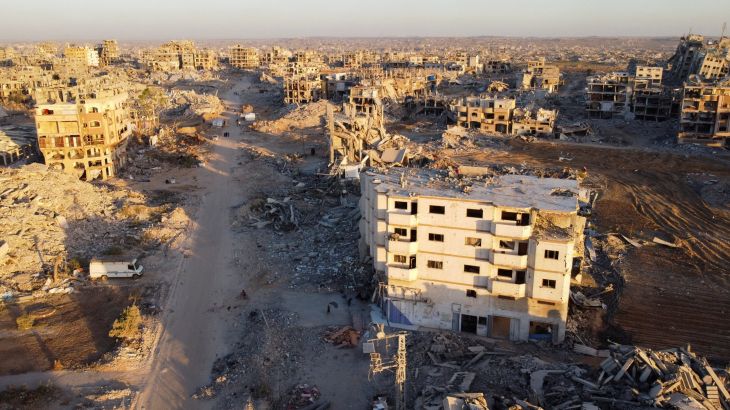Israel’s war on Gaza, curbs drive Palestinian economy to record collapse
UNCTAD warns two years of attacks and longstanding restrictions have driven occupied Palestinian territory’s economy into its most severe contraction.

Gaza’s shattered economy turns to digital apps for survival amid cash shortage
By Caolán Magee
Published On 25 Nov 202525 Nov 2025
Save
The economy of the occupied Palestinian territory is facing its most severe collapse on record, driven by the scale of Israel’s war on Gaza and continued restrictions on movement and trade, according to a new United Nations report.
Published on Monday, the report by the UN Conference on Trade and Development (UNCTAD) said two years of Israeli military operations and longstanding curbs have pushed the occupied territory into an economic downturn now ranked among the 10 worst collapses recorded globally since 1960.
Recommended Stories
list of 4 itemsend of list
“Extensive damage to infrastructure, productive assets and public services has reversed decades of socioeconomic progress in the Occupied Palestinian Territory,” it said, referring to the Gaza Strip and the West Bank, including East Jerusalem.
The situation in Gaza constitutes “the most severe economic crisis on record”, it warned.
The publication of the findings comes as Israeli attacks on Gaza continue, despite a six-week ceasefire between Israel and the Palestinian group Hamas.
Israel’s assault began on October 7, 2023, after an attack on southern Israel by fighters from Hamas and other Palestinian groups, during which an estimated 1,139 people were killed and about 240 were taken into Gaza as captives.
In response, Israel unleashed a bombing campaign and tightened its longstanding blockade on Gaza, turning what had already been a 16-year siege into a total stranglehold. Its attacks have killed at least 69,733 people and wounded 170,863, with more than 300 killed since the start of the ceasefire last month.
Advertisement
Falling GDP
According to the UNCTAD report, the Palestinian gross domestic product (GDP) had regressed to its 2010 level by the end of last year, while GDP per capita returned to the level seen in 2003, erasing 22 years of development in less than two years.
In Gaza, GDP plunged 83 percent in 2024 compared with the previous year, totalling an 87 percent drop over two years to $362m. GDP per capita plummeted to $161, placing it among the lowest in the world.
The report documented that nearly two decades of Israeli‐imposed blocks on trade, movement and access have generated near-total dependence on external aid, while Israeli attacks have damaged about 174,500 structures in Gaza, propelling the enclave into “utter ruin”.
Meanwhile, the occupied West Bank is also experiencing its most severe economic downturn on record, with movement and access restrictions and the collapse of jobs.
“Across the Occupied Palestinian Territory, the steepest economic contraction on record has wiped out decades of progress,” the report added.
The report says Israel’s withholding of fiscal revenues owed to the Palestinian Authority (PA) has significantly worsened the crisis, severely limiting the government’s ability to pay salaries, maintain services and finance reconstruction efforts.
The PA said on Monday that Israel was withholding $4bn of tax revenues.
The road to recovery
UNCTAD estimated that the cost of reconstruction and recovery in Gaza alone will exceed $70bn and called for a comprehensive recovery plan that is backed by coordinated international assistance, the restoration of fiscal transfers and urgent measures to ease constraints on trade, movement and investment.
“Even with substantial aid, recovery to pre-October 2023 GDP levels could take decades,” it said.
The agency also warned that without immediate, large-scale intervention, the destruction caused by Israel’s war and systemic restrictions will trap the Palestinian economy in a long-term slump.
For any meaningful recovery, UNCTAD said, the ceasefire achieved in October must be durable.
“UNCTAD’s report calls for immediate and substantial intervention by the international community to halt the economic freefall, address the humanitarian crisis, and lay the groundwork for lasting peace and development,” it added.

